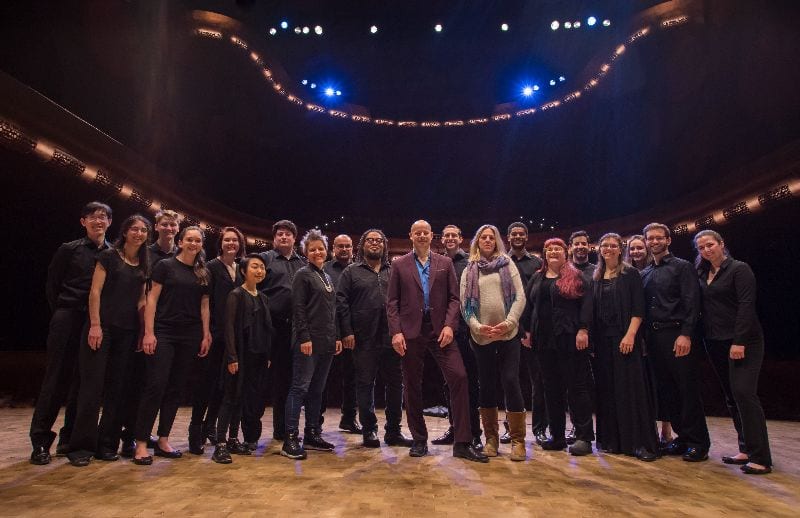
Director of Jazz Studies & Associate Professor of Music Johannes Wallmann is releasing a new album on Shifting Paradigm Records on June 25, 2021.
Elegy for an Undiscovered Species is the Wisconsin-based German-Canadian pianist’s ninth album as a leader and his most ambitious effort to date: a full-length album of new compositions for jazz quintet and string orchestra. The album is the centerpiece of the work Wallmann did with his Emily Mead Baldwin award from the Division of the Arts.
The 19-piece ensemble is fronted by two New Yorkers, trumpeter Ingrid Jensen (member of jazz super group ARTEMIS, first-choice soloist for the bands of Maria Schneider and Darcy James Argue, bandleader, and Director of Jazz Arts at Manhattan School of Music) and tenor saxophonist Dayna Stephens (winner, “Rising Star—Tenor Saxophone,” DownBeat Critics Poll). Both have been long-time key contributors to previous Wallmann albums. Jensen and Wallmann share musical roots on Vancouver Island, and Wallmann first met Stephens when he moved from New York to Oakland just as the saxophonist was making his move in the opposite direction. Throughout Elegy, the stars are given plenty of room to blow.
The ensemble is powered by a rhythm tandem of Madison bassist Nick Moran, a fulcrum of Wisconsin’s thriving jazz scene, and New York drummer Allison Miller.
Wallmann recounts: “As this project was taking shape, I knew I wanted a drummer with a deep pocket first of all, and also someone who would light a fire under the band. But I was writing intricate contrapuntal string parts, and drums could easily overwhelm that, so the drum chair was crucial and required a very special player. I love Allison’s records as a band leader, and when I saw her tour with her band Parlour Game and heard how deeply grooving and also sensitively she played with [violinist and co-leader] Jenny Scheinman, I instantly knew that I wanted her to be part of my album! As a bandleader and composer, Allison brings the perfect sensibility to my writing.”
The ensemble is rounded out by a 14-piece string orchestra of School of Music musicians, conducted by Michael Dolan. String orchestra musicians include Kaleigh Acord (concert master), Maynie Bradley, Mercedes Cullen (principal), Glen Kuenzi, Chang-En Lu, Anna Luebke, Richard Silvers, Mary Shin, violins; Emma Cifrino, Pedro Oviedo, Rachel Riese (principal), violas; Hannah Kasun, Cole Randolph (principal), Ben Therrell, cellos.
The album was recorded over two days at the Hamel Music Center in Madison directly following a live concert in late February 2020 and just weeks prior to the Covid shutdown.
“I was sweating bullets,” Wallmann recounts. “China and Italy were already on lockdown, international travel shutdowns were increasing, and the virus was knocking on our door as well. We got very lucky to be able to have this one last opportunity to make music with joyful abandon before this awful year of no live music.”
Two years in the making, the album’s six long-form compositions showcase Wallmann’s arranging and orchestration skills. He weaves catchy but idiosyncratic melodies that are playful with a tinge of melancholy through the peaks and valleys of extended solos, shimmering orchestral textures and harmonic and orchestral transformations.
Yet, groove is at the center of each piece: the title track is a musical protest against the Anthropocene Extinction with an urgent melody set over a driving bass ostinato, while Stephens, Wallmann and Jensen are all featured on extended solos. The cheekily titled waltz “In Three,” with Stephens switching to the EWI, reveals its meter only gradually. “Expeditor” is grounded by a swirling 15/4 groove, where Miller, Moran on electric bass, soloists and string orchestra all get the chance to get funky.
The wistful “Longing” is a rare Bossa Nova in 3/4 meter. Wallmann recounts, “‘Longing’ is one of three pieces on the album that began life as small-group compositions. Whenever I brought it into a rehearsal or to gig, players would ask, ‘What’s a Bossa Nova in 3?’ And I would play for them [Antonio Carlos] Jobim’s ‘Luiza’ and they would say ‘Ah-huh!’ and they would get it.”
Building on his early classical music background and extensive study of orchestral scores, Wallmann integrates the string orchestra as an equal melodic voice throughout the album. Far from being just traditional “sweeteners,” the orchestra becomes another player in the group as it swaps melody features and supporting responsibilities with the horns, provides rhythmic counterpoint, contributes extended soli passages on “Expeditor” and “Longing,” and is featured in an a cappella role on “The Greater Fool.”
“Greater Fool,” travels over ten minutes from rubato ballad to frantic drum solo as a musical reflection on humanity’s destructive habit of bidding up increasingly worthless investments, such as coastal floodplain real estate developments, making the calculus that well before a crash, the investment can be profitably sold to an even “greater fool” who will get stuck with the loss. The ultimate losers of such shortsighted thinking are, of course, our society and planet.
Beyond protest, the album also features plenty of joy. “Two Ears Old” is a birthday celebration for Wallmann’s daughter: “A lot of this music was written during a sabbatical from my teaching job in 2019 when my daughter turned two. We had been practicing with her how to tell people her age, but she misheard us, so whenever someone asked her how old she was, she would point at her right ear, then her left ear, and count them, ‘one… two…two ears old!’ It’s one of those many fraught but beautiful moments of children trying to figure out how the world works, and I didn’t want to ever forget it, so I sat down and wrote a piece about it.”
At its core, Elegy for an Undiscovered Species demonstrates the power of connection, blending east coast and midwest, jazz quintet and string orchestra, into a cohesive and powerful ensemble. It suggests that perhaps we as a collective can come together and overcome the challenges that we face.
When not building Lego towers with his daughter, Wallmann leads the University of Wisconsin-Madison’s jazz program as the inaugural holder of the Peterson Chair in Jazz Studies. Prior to moving to Madison in 2012, he spent five years teaching at the California State University East Bay near Oakland. Wallmann studied jazz piano and composition at Berklee College of Music and at New York University. His formative professional years were his twenties and early thirties in New York City, where he made his living playing jazz in bars, clubs, department stores and concert halls. He has toured extensively throughout North America, Europe, and Asia performing with many notable artists including Ralph Alessi, Seamus Blake, Gilad Hekselman, Matt Penman and Kevin Mahogany.
Wallmann has previously recorded eight critically acclaimed albums as a leader, including The Johannes Wallman Quartet (1997), Alphabeticity (2003), Minor Prophets (2007), The Coasts (2010) and Always Something (2015). His 2015 quintet album, The Town Musicians, was named an Editors’ Pick by DownBeat Magazine, which called Wallmann “a remarkable pianist and composer…his evocative compositions are brimming with melodic cogency and rhythmic pull.”
Wallmann’s work embraces advocacy for human and environmental rights, and the Wisconsin Gazette called his 2018 album Love Wins “one of the most interesting and accomplished jazz albums to come out in recent years. Love Wins has taken the uniquely American art form to the next step of its creative journey.” The album was named a “Best Albums of 2018” by Something Else! And the UK’s Jazz Journal wrote, “Wallmann makes a septet sound like something much larger, as big as his subject, maybe. Love Wins is as musically challenging as it is socially, and deserves to be heard on both counts.” In 2018, Wallmann released Day and Night, his debut album on Shifting Paradigm Records, which DownBeat described as “confident, muscular and elegant.”
